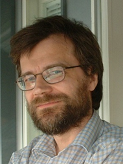Important Dates
Abstract Registration: Nov 17, 2014
Nov 28, 2014 (extended deadline)
Full Paper Submission: Nov 28, 2014
Dec 8, 2014 (firm deadline)
Acceptance Notification:
Mar 7, 2015
Camera Ready and Early Registration:Mar 18, 2015 Mar 25, 2015
Networking Conference:
May 20-22, 2015




Toulouse Pictures

Download the  IFIP Networking 2015 Final Program
IFIP Networking 2015 Final Program
08:00
Registration
08:30
Opening session
09:00
Keynote#1
Session chair: Ilkka Norros (VTT Technical Research Centre of Finland, Finland)
Room: B00
Keynote#1: Energy efficiency in 5G mobile networks
Aarne Mämmelä, VTT Technical Research Centre of Finland
10:00
Coffee break
10:30
S-1A: Wireless Sensor Networks
Session chair: Rahim Kacimi (IRIT - University of Toulouse, France)
Room: B00
LT Codes Based Distributed Coding for Efficient Distributed Storage in Wireless Sensor Networks
Xiucai Ye and Jie Li (University of Tsukuba, Japan); Wen-Tsuen Chen (Academia Sinica, Taiwan); Feilong Tang (Shanghai Jiao Tong University, P.R. China)
Performance of in-network processing for visual analysis in wireless sensor networks
Hussein Al-Zubaidy (Royal Institute of Technology (KTH), Sweden); György Dán (KTH Royal Institute of Technology, Sweden); Viktoria Fodor (KTH, Sweden)
2D-UBDA: A Novel 2-Dimensional Underwater WSN Barrier Deployment Algorithm
Zakia Khalfallah (UPMC, France); Ilhem Fajjari (Virtuor & University Pierre et Marie Curie, France); Nadjib Aitsaadi (LiSSi - University of Paris-Est Creteil (UPEC), France);
Rami Langar (UPMC - University of Paris 6, France); Guy Pujolle (University Pierre et Marie Curie - Paris 6, France)
S-1B: Caching
Session chair: Ilkka Norros (VTT Technical Research Centre of Finland, Finland)
Room: C002
Congestion Games in Caching Enabled Heterogeneous Cellular Networks
Vineeth S Varma (Singapore University of Technology and Design, France); Tony Q. S. Quek (Singapore University of Technology and Design, Singapore)
CCndnS: A strategy for spreading content and decoupling NDN caches
Mostafa Rezazad and Y. C. Tay (National University of Singapore, Singapore)
Pragmatic Router FIB Caching
Kaustubh Gadkari (CSU, USA); M. Lawrence Weikum (Colorado State University, USA); Daniel Massey (US Department of Homeland Security & Science and Technology Directorate, Cyber Security Division, USA);
Christos Papadopoulos (Colorado State University, USA)
12:00
Lunch break
14:00
S-2A: Queue Management and Scheduling
Session chair: Aarne Mämmelä (VTT, Finland)
Room: B00
Active Sense Queue Management (ASQM)
Daniel M. Havey and Kevin C Almeroth (University of California, Santa Barbara, USA)
Non-Intrusive Scheduling of TCP Flows
Denis Carvin (LAAS-CNRS, France); Urtzi Ayesta (CNRS-LAAS and Ikerbasque-University of the Basque Country, Spain);
Lionel Bertaux (LAAS-CNRS, France)
Queue-aware Uplink Scheduling: Analysis, Implementation, and Evaluation
Amr Rizk (University of Massachusetts Amherst, USA); Markus H Fidler (Leibniz Universität Hannover, Germany)
S-2B: Content Centric Networking
Session chair: Y. C. Tay (National University of Singapore, Singapore)
Room: C002
An Encryption-Based Access Control Framework for Content-Centric Networking
Jun Kurihara (KDDI R&D Laboratories Inc., Japan); Christopher Wood (University of California, Irvine, USA);
Ersin Uzun (PARC, USA)
Information Resilience through User-Assisted Caching in Disruptive Content-Centric Networks
Vasilis Sourlas (University College London, United Kingdom); Leandros Tassiulas (Yale University, USA);
Ioannis Psaras and George Pavlou (University College London, United Kingdom)
A Fault-Tolerant Forwarding Strategy for Interest-based Information Centric Networks
JJ Garcia-Luna-Aceves (University of California at Santa Cruz, USA)
15:30
Coffee break
16:00
S-3A: Routing I
Session chair: Stefano Secci (University Pierre et Marie Curie, France)
Room: B00
AS Path Inference: From Complex Network Perspective
Narisu Tao, Xu Chen and Xiaoming Fu (University of Goettingen, Germany)
Traffic duplication through segmentable disjoint paths
François Aubry and David Lebrun (Université Catholique de Louvain, Belgium); Yves Deville (Universite Catholique de Louvain, Belgium);
Olivier Bonaventure (Université catholique de Louvain, Belgium)
Source-specific routing
Matthieu Boutier (Université Paris Diderot, Laboratoire PPS, France);
Juliusz Chroboczek (University of Paris-Diderot, France)
S-3B: Multimedia
Session chair: Hussein Al-Zubaidy (Royal Institute of Technology (KTH), Sweden)
Room: C002
VoIP-based Calibration of the DQX Model
Christos Tsiaras (University of Zurich & Communication Systems Group, Switzerland);
Manuel Rösch (University of Zurich, Switzerland); Burkhard Stiller (University of Zürich & ETH Zürich, TIK, Switzerland)
Network-layer Fairness for Adaptive Video Streams
Ahmed Mansy (Georgia Tech, USA); Marwan Fayed (University of Stirling, United Kingdom);
Mostafa Ammar (Georgia Institute of Technology, USA)
Towards Joint Resource Allocation and Routing to Optimize Video Distribution over Future Internet
Yichao Jin and Yonggang Wen (Nanyang Technological University, Singapore); Cedric Westphal (Huawei Innovation Center, USA)
18:30 - 20:30
Welcome Reception - City Hall and Le Florida Brasserie
09:00
Keynote#2
Session chair: Y. C. Tay (National University of Singapore, Singapore)
Room: B00
Keynote#2: Virtualization techniques: Opportunities for fixed/mobile convergence
Fabrice Guillemin, Orange Labs, France
10:00
Coffee break
10:30
S-4A: Routing II
Session chair: Christos Papadopoulos (Colorado State University, USA)
Room: B00
MDTC: An Efficient Approach to TCAM-based Multidimensional Table Compression
Hanqing Zhu and Mingwei Xu (Tsinghua University, P.R. China); Qing Li (Graduate School at Shenzhen, Tsinghua University, P.R. China); Jun Li (University of Oregon, USA); Yuan Yang (Tsinghua University, P.R. China); Suogang Li (CERNET National Network Center, P.R. China)
Automatic Protocol Field Inference for Deeper Protocol Understanding
Ignacio Nicolas Bermudez, Alok Tongaonkar (Symantec Corp., USA); Marios Iliofotou (Caspida Inc., USA); Marco Mellia and Maurizio M. Munafo' (Politecnico di Torino, Italy)
On the Inter-domain Scalability of Route-by-Name Information-Centric Network Architectures
Konstantinos V. Katsaros (University College London, United Kingdom); Xenofon Vasilakos (Athens University of Economics and Business, Greece); Timothy Okwii (University College London, United Kingdom); George Xylomenos (Athens University of Economics and Business, Greece); George Pavlou (University College London, United Kingdom); George C. Polyzos (Athens University of Economics and Business, Greece)
S-4B: Network Architectures
Session chair: Fabrice M. Guillemin (Orange Labs, France)
Room: C002
Network Service Embedding across Multiple Providers with Nestor
David Dietrich, Ahmed Abujoda and Panagiotis Papadimitriou (Leibniz Universität Hannover, Germany)
Multihomed Mobile Network Architecture
Ibrahim S. Alsukayti and Christopher Edwards (Lancaster University, United Kingdom)
Toward Fully Coordinated Multi-level Multi-carrier Energy Efficient Networks
Piotr Wiecek (Wroclaw University of Technology, Poland); Majed Haddad (INRIA, France); Habachi Oussama (LIA, France); Yezekael Hayel (LIA, University of Avignon, France)
12:00
Lunch break
14:00
S-5A: Data Offloading and the Cloud
Session chair: Konstantinos V. Katsaros (University College London, UK)
Room: B00
Cloudlet Network Design Optimization
Alberto Ceselli (Università di Milano, Italy); Marco Premoli (Universita' degli Studi di Milano, Italy); Stefano Secci (University Pierre et Marie Curie - Paris 6, France)
Dynamic Service Migration in Mobile Edge-Clouds
Shiqiang Wang (Imperial College London, United Kingdom); Rahul Urgaonkar (IBM Research, USA); Murtaza Zafer (Nyansa Inc., USA); Ting He (IBM Research, USA); Kevin S Chan (US Army Research Laboratory, USA); Kin K. Leung (Imperial College, United Kingdom)
Energy-Aware Opportunistic Mobile Data Offloading for Users in Urban Environments
Sylvia T. Kouyoumdjieva (KTH, Royal Institute of Technology, Sweden); Gunnar Karlsson (KTH Royal Institute of Technology, Sweden)
Geographically Fair In-Network Caching for Mobile Data Offloading
Mahmoud El Chamie (The University of Texas at Austin, USA); Chadi Barakat (INRIA Sophia Antipolis, France); Giovanni Neglia (INRIA Sophia Antipolis Mediterranee, France)
S-5B: Software Defined Networking
Session chair: Jie Li (University of Tsukuba, Japan)
Room: C002
DHA: Distributed Decisions on the Switch Migration Toward a Scalable SDN Control Plane
Guozhen Cheng and Hongchang Chen (National Digital Switching System Engineering & Technological R&D Center, P.R. China); Zhiming Wang (National Digital Switching System Engineering & Technological R&D Center & Individual Purchaser, P.R. China); Shuqiao Chen (National Digital Switching System Engineering & Technological R&D Center, P.R. China)
Online Virtual Links Resource Allocation in Software-Defined Networks
Mikaël Capelle, Slim Abdellatif, Marie-José Huguet and Pascal Berthou (CNRS/LAAS - Université de Toulouse, France)
Achieving Near-optimal Traffic Engineering Solutions in Hybrid Software Defined Networks
Jun He and Wei Song (University of New Brunswick, Canada)
Developing a Traffic Classification Platform for Enterprise Networks with SDN: Experiences & Lessons Learned
Bryan Ng, Matthew J Hayes and Winston K.G. Seah (Victoria University of Wellington, New Zealand)
16:00
Coffee break
16:30
S-6A: Measurements
Session chair: Jordi Domingo-Pascual (Universitat Politecnica de Catalunya, Spain)
Room: B00
IPv4 versus IPv6 - Who connects faster?
Vaibhav Bajpai and Jürgen Schönwälder (Jacobs University Bremen, Germany)
Lightweight Mobile Bandwidth Availability Measurement
Foivos Michelinakis, Nicola Bui, Guido Fioravantti and Joerg Widmer (IMDEA Networks Institute, Spain); Fabian Kaup and David Hausheer (TU Darmstadt, Germany)
Exploiting Intra-Packet Dependency for Fine-Grained Protocol Format Inference
Qun Huang (The Chinese University of Hong Kong, P.R. China); Patrick Pak-Ching Lee (The Chinese University of Hong Kong, Hong Kong); Zhibin Zhang (Institute of Computing Technology, Chinese Academy of Sciences, P.R. China)
S-6B: Network Dependability and Security
Session chair: Gerardo Rubino (Inria/Irisa, France)
Room: C002
FastID: an Undeceived Router for Real-time Identification of WiFi Terminals
Li Lu (University of Electronic Science and Technology of China, P.R. China); Wang Runzhe (UESTC, P.R. China); Jing Ding, Mao Wubin and Wei Chen (University of Electronic Science and Technology of China, P.R. China); Hongzi Zhu (Shanghai Jiao Tong University, P.R. China)
Global VoIP Security Threats -- Large Scale Validation Based on Independent Honeynets
Markus Gruber, Florian Fankhauser, Christian Schanes and Thomas Grechenig (Vienna University of Technology, Austria); Dirk Hoffstadt and Adan Aziz
(University of Duisburg-Essen, Germany); Erwin P. Rathgeb (Universität Duisburg-Essen, Germany)
Survivable Routing Meets Diversity Coding
Alija Pašić, János Tapolcai and Péter Babarczi (Budapest University of Technology and Economics, Hungary); Erika R. Kovács (Eötvös University, Budapest, Hungary); Zoltán Király (Eötvös University, Hungary); Lajos Rónyai (Budapest University of Technology and Economics (BME), Hungary)
19:30 - 22:30
Conference Dinner - Le Maoï Restaurant
08:30
S-7A: Localization and Sensors
Session chair: Jocelyne Elias (University Paris Descartes, France)
Room: B00
Scalable Sensor Localization via Ball-Decomposition Algorithm
Yasushi Kawase (Tokyo Institute of Technology, Japan); Takanori Maehara (Shizuoka University, Japan); Ken-ichi Kawarabayashi (National Institute of Informatics, Japan)
Dynamic Active Area Clustering with Inertial Information for Fingerprinting based Indoor Localization Systems
Fan Yang and Jia-Liang Lu (Shanghai Jiao Tong University, P.R. China); Fabrice Theoleyre (CNRS - University of Strasbourg, France); Wei Shu (The University of New Mexico, USA); Min-You Wu (Shanghai JiaoTong University, P.R. China)
Algorithms for Distributed Feature Extraction in Multi-camera Visual Sensor Networks
Emil Eriksson (Royal Institute of Technology, Sweden); György Dán (KTH Royal Institute of Technology, Sweden); Viktoria Fodor (KTH, Sweden)
S-7B: Peer to Peer Systems
Session chair: Pedro Casas (Telecommunications Research Center Vienna (FTW), Austria)
Room: C002
Decentralized credit mining in P2P systems
Mihai Capotă and Johan Pouwelse (Delft University of Technology, The Netherlands); Dick Epema (Delft University of Technology & Eindhoven University of Technology, The Netherlands)
How Dynamic Is ISP Address Space? Towards Internet-Wide DHCP Churn Estimation
Giovane C. M. Moura, Carlos Gañán, Qasim Lone, Payam Poursaied, Hadi Asghari and Michel van Eeten (Delft University of Technology, The Netherlands)
TopT: Supporting Flash Crowd Events in Hybrid Overlay-based Live Streaming
Julius Rückert, Björn Richerzhagen, Eduardo Lidanski and Ralf Steinmetz (Technische Universität Darmstadt, Germany); David Hausheer (TU Darmstadt, Germany)
10:00
Coffee break
10:30
Keynote#3
Session chair: Gerardo Rubino (Inria/Irisa, France)
Room: B00
Keynote#3: Storms in Mobile Networks: Modelling, Detection and Mitigation
Erol Gelenbe, Imperial College, UK
11:30
S-8A: Cognitive Radio
Session chair: Robert Bestak (Czech Technical University in Prague, Czech Republic)
Room: B00
Spectrum Aware Virtual Coordinates Assignment and Routing in Multihop Cognitive Radio Network
Di Li and Zhichao Lin (RWTH-Aachen University, Germany); Mirko Stoffers (RWTH Aachen University, Germany); James Gross (Royal Institute of Technology (KTH), Sweden)
Distributed Spectrum Management in TV White Space Cognitive Radio Networks
Jocelyne Elias (Université Paris Descartes & Sorbonne Paris Cité, France); Marwan Krunz (University of Arizona, USA)
S-8B: Traffic Analysis
Session chair: Ilkka Norros (VTT Technical Research Centre of Finland, Finland)
Room: C002
Online Social Networks Anatomy: on the Analysis of Facebook and WhatsApp in Cellular Networks
Pierdomenico Fiadino, Pedro Casas and Mirko Schiavone (Telecommunications Research Center Vienna (FTW), Austria); Alessandro D'Alconzo (Telecommunications Research Center Vienna (ftw.), Austria)
Impact of Provider Failures on a University's Traffic
Rodrigo Duarte (UFJF, Brazil); Alex Borges Vieira (Universidade Federal de Juiz de Fora, Brazil); Italo Cunha (Universidade Federal de Minas Gerais, Brazil); Jussara M. Almeida (Federal University of Minas Gerais, Brazil)
12:30
Lunch Break
13:45
Closing Session - Room: B00
14:00
Half day Trip - Medieval Carcassonne City
Energy efficiency in 5G mobile networks
Aarne Mämmelä, VTT Technical Research Centre of Finland
 Slides
Slides
Abstract
5G systems will be used in the 2020’s. Moore’s exponential law has been slowing down since about 2000 and it will eventually undergo a thermal noise death in about 2020-2030. The switching energy of CMOS electronics will approach the thermal noise spectral density. Future networks are expected to carry 1000 times more mobile data in ten years but the energy efficiency of CMOS technology is expected to improve only by a factor of 10 when before about 2000 the energy efficiency improved by a factor of 100 in ten years. The technology trends and fundamental limits in the physical layer will have a direct effect on all upper layers. Networks do not only consume energy in transmission in power amplifiers but also in computation in algorithms and protocols. Computation energy will be more important in small cells that are expected to be used in places where user density is high. The author’s background is in the physical layer.
Bio

Aarne Mämmelä (aarne.mammela@vtt.fi) was born in Vihanti, Finland in 1957. He received the degrees of Master of Science in Engineering, Licentiate in Technology, and Doctor of Technology (all with honors) from the University of Oulu, Oulu, Finland in 1983, 1988, and 1996, respectively. His doctoral thesis was on diversity (RAKE) receivers in fast fading multipath channels. From 1982 to 1993 he was with the Telecommunication Laboratory at the University of Oulu and carried out research on adaptive algorithms in spread-spectrum systems in wireless communications systems. From 1987 he gave several undergraduate and postgraduate courses as a part-time teacher, acting associate professor, or acting professor in different areas of the physical layer in wireless communications. He visited the University of Kaiserslautern in Germany in 1990-1991 as a visiting research scientist. He joined the VTT Technical Research Centre of Finland in Oulu, Finland in 1993. Since 1996 he has been a research professor of digital signal processing in wireless communications and in 2001 he received a tenure position. He visited the University of Canterbury in New Zealand in 1996-1997 as a postdoctoral research scientist. During 2000-2010 he was a docent (adjunct professor) at the Helsinki University of Technology (merged later to Aalto University) and since 2004 he has been a docent at the University of Oulu. During 2001-2011 he gave regularly a major part of the lectures in a postgraduate course on research methodology at the University of Oulu, finally offered for the whole Faculty of Technology. During the last years about 50-60 students annually attended the course. He has given the lectures several times at the Helsinki University of Technology and once also at the University of Modena in Italy. He is especially interested in research methods in engineering, philosophy and history of science and engineering, systems analysis and engineering, resource (energy) efficiency, and adaptive estimation and synchronization problems.
Virtualization techniques: opportunities for fixed/mobile convergence
Fabrice Guillemin, Orange Labs, France
 Slides
Slides
Abstract
Fixed/mobile convergence is a recurrent problem in the design of telecommunication networks. Mobile and fixed networks have been developed in the past few decades independently one of each other, mobile networks relying on highly centralized platforms and a few gateways to interconnect with the Internet for data traffic. The expectations of users with the widespread of tablets, smartphones, etc. are however rapidly changing and there is clearly a need to be able to seamlessly move from one network to another without session interruption. This is all the more essential as users massively use radio technologies to connect to the Internet, for instance through WiFi, cellular connections being in general able to ensure radio coverage between two WiFi hotspots. One major obstacle to fixed/mobile convergence is that networks are built upon functions hosted by dedicated hardware (e.g., the functions of the evolved packet core for cellular networks). With the emergence of virtualization techniques, it becomes possible to instantiate functions on standard hardware, making it possible to host on the same piece of equipment or in the cloud cellular and fixed access functions. In this talk, we exemplify this opportunity by describing the design of a convergent gateway aimed at realizing fixed/mobile convergence, such a gateway being instantiated by a network operating system.
Bio

Fabrice Guillemin graduated from Ecole Polytechnique in 1987 and from Telecom Paris in 1989. He received the PhD degree in computer science from the University of Rennes in 1992 and defended his habilitation thesis at the University Pierre and Marie Curie in 1999. Since 1989, he has been with the R&D center of France Telecom (former CNET) in Lannion. He participated in the Metropolis project (metrology of Internet traffic) and was the project leader of the ASIA (lightweight signaling for the Internet over ATM) and OSCAR (security in overlay networks) funded by the French national agency for research. He also participated in the European projects Evergrow and 4WARD (Internet of the future). Fabrice Guillemin was also involved in the standardization of the ATM technology (ATM Forum and ITU). His research interests are in queuing theory and probability applied to congestion control and traffic metrology in telecommunication networks (Internet and mobile networks). Fabrice Guillemin is currently leading a project on the evolution of the control planes of networks at Orange Labs.
Storms in Mobile Networks: Modelling, Detection and Mitigation
Erol Gelenbe, Imperial College, UK
Abstract
Network attacks are designed to be simple to set up for the attacker, and ideally they exploit deficiencies in the network that is being attacked. A good example are the storm attacks against mobile networks that actually exploit the intrinsic characteristics of the network's normal operations. In this paper we will show how storm attacks can be set up, how they can be mitigated against, and how they could be considerably attenuated if we could change some of the standards used in mobile telephony.
Bio

Professor Erol Gelenbe, Fellow of ACM and IEEE and recipient of the IFIP Silver Core Award in 1980, was born in Turkey where he obtained his undergraduate engineering degree from METU. He is a member of the Science Academies of Belgium, Hungary, Poland and Turkey, and a member of the French National Academy of Technologies. He holds the Gabor Chair Professorship in Electrical and Electronic Engineering at Imperial College, where he is Head of the Intelligent Systems and Networks Group. He currently coordinates the EU Project NEMESYS on mobile network security, and is also active in Green IT.
Vasilis Sourlas (University College London, United Kingdom); Leandros Tassiulas (Yale University, USA); Ioannis Psaras and George Pavlou (University College London, United Kingdom)





